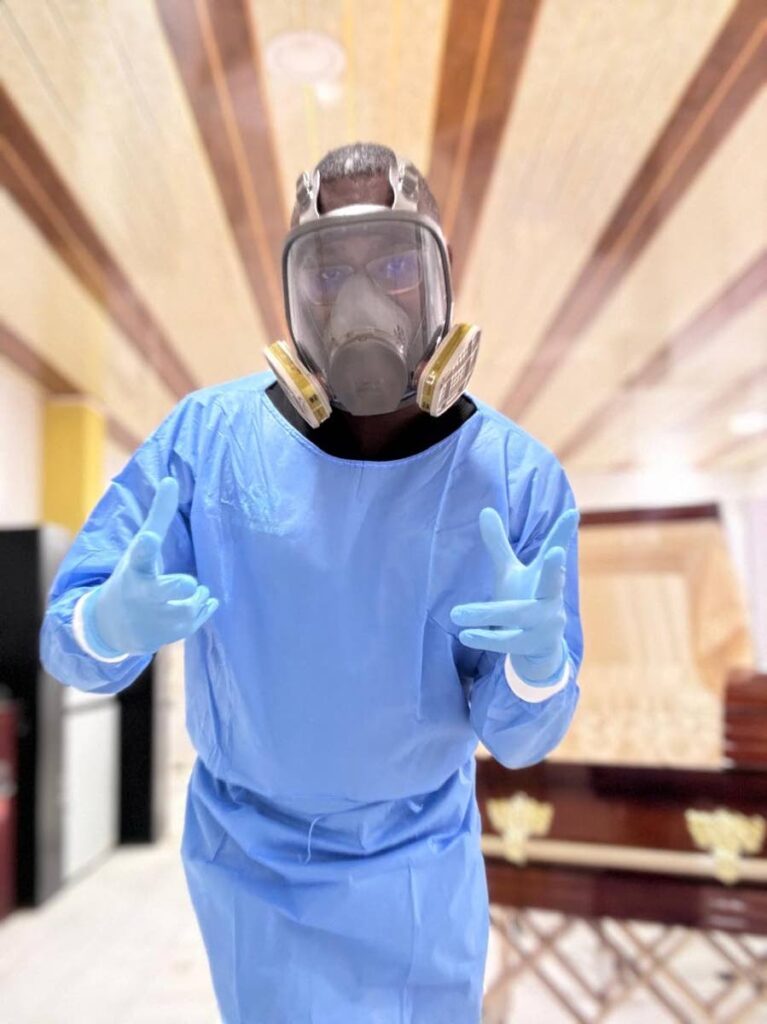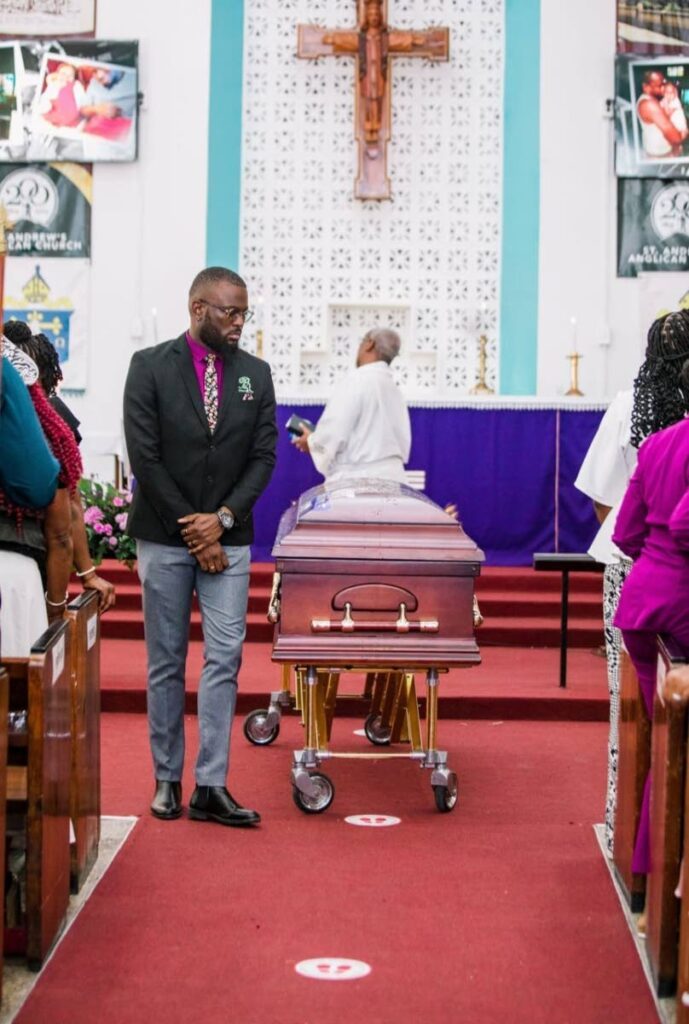Qwasi Williams dispels embalming misconceptions

QWASI WILLIAMS knows that embalming is not the most glamorous profession or one that most people readily gravitate to. And he doesn’t care.
For him, it’s a dream career.
“It’s true that the profession of embalming is often viewed with misconceptions or seen as unconventional. However, for those who choose this career, there are aspects that are deeply meaningful and fulfilling,” Williams, 35, told Newsday on March 24.
A junior embalmer at Belgrove’s Funeral Home, Lambeau, Tobago, Williams admitted that choosing such a career can trigger a variety of reactions from family members.
“Some families might be supportive and proud, appreciating the importance and dignity of the work in helping families during difficult times while others might be uncomfortable with or have misconceptions about the nature of the work due to its association with death. In such cases, they may need reassurance about the safety and ethical standards of the profession.”
He believes communication is the key to dispelling the misconceptions.
“Open discussions about the role and responsibilities of an embalmer as well as sharing the personal stories of the profession can help family members understand and support such a career choice.”
Williams has been practising since 2009 “and I can wholeheartedly say that this journey has been incredibly fulfilling and humbling.”
“Over the years, I have had the privilege of meeting families from all walks of life, each bringing diverse cultural backgrounds and unique stories. These encounters have enriched my understanding and appreciation of the profound role we play during such critical moments in people’s lives.”
Saying his passion for the job remains as strong as it was when he began, Williams said each day presents new opportunities to learn and serve, fostering a sense of excitement and purpose.
“The practice of creating a lasting and dignified final physical memory for loved ones is not merely a responsibility, it is a joy that fulfils my passion for helping others during their time of need.”
Williams continued, “I am truly grateful for the trust families place in me during such sensitive times and I consider it an honour to support them by preserving the dignity of those they hold dear. This profound aspect of my work continues to inspire and motivate me.”

Most people, he said, are drawn to the field because they have a strong desire to help families through the grieving process and view embalming as one of the ways to provide comfort and dignity to those who have passed.
He added some may be fascinated with the science and art involved in embalming, including anatomy, chemistry and restorative techniques, while others may be driven by a family tradition to work in the funeral industry.
Embalming, Williams said, involves a combination of scientific knowledge and artistic skill.
“Restoration and preparation require precision and care.”
He said while it may not seem glamorous to some, those in the profession often express a deep sense of personal satisfaction and purpose in their work.
“Everyone’s perspective on what is or isn’t an appealing career can be different but for embalmers, the work is more about the significance and impact on others rather than seeking glamour.”
Williams was a student of St Benedict’s College, La Romaine, when he began working at Belgrove’s during a vacation period in 2005.
He started as an attendant in the company’s carpark and when he turned 18 began working as a funeral attendant. Williams was eventually promoted to mortuary attendant and later, mortuary assistant and embalmer trainee.
“After completing CXC a few years after, I prayed and asked God to align me with my destiny and the rest is history. I have qualified myself through Belgrove’s, which provided courses for my advancement.
He said senior embalmers Glendon Belgrove and Mauricia Stephen were his mentors during his early years in the field.
Williams began working at Belgrove’s, Tobago, in 2016, “on a back and forth basis.” Two years later, he was confirmed in the position.
“I packed up meh Georgie bundle and made it my home.”
He said his experience at Belgrove’s has been phenomenal.
“It’s a company where I never felt like I had to work. The joy of getting to the mortuary early and ensuring that your loved ones are prepared to international standards through the standard of care policy that we employ.”

His face lit up when he recalled an event he attended in New Orleans, last year, with the company’s CEO Keith Belgrove.
“Being able to attend that event, hosted by the National Funeral Directors Association with the CEO was quite the thrill for me and I thank him for that. Sitting among and engaging with international funeral homes and embalmers really pivoted me in an entirely different space. So now I have a greater fondness for what I do.
“While this may sound weird, I like working for a company that has values, rules, structure, avenues for growth and encourages you to excel in your career while not abdicating your personal development.”
Williams said Tobago offers a particularly “folksy dynamic” which, he believes, makes his job all the more meaningful and worthwhile.
“I like how families have repass. It’s almost like a party. And they will not be pleased if we don’t attend. Anywhere there is food and LLB, I’m there.”
He said people who excel in embalming usually possess a balance of emotional strength, compassion and technical skill, enabling them to navigate both the scientific and human aspects of the job. Those desirous of pursuing such a career must have the requisite education, training and licensing.
Williams said he is currently pursuing further courses to advance to a different level in funeral service.
A typical day for Williams begins with a review of his work schedule. This might involve checking arrangements for impending viewings or services and prioritising work based on urgency and family needs.
After receiving the deceased, a thorough examination is done. This assessment helps to plan the approach to the embalming process, taking into account any specific family requests or conditions affecting the body.
Williams said after the body is embalmed, he washes and dries it, styles the hair, applies make-up where necessary and dresses the deceased (if the family so desires). The aim is to make the body look as natural as possible.
He said he is required to keep detailed records of the embalming process, chemicals used and any observations.
“Compliance with local health regulations and standards of practice is crucial.”
Williams said embalmers often communicate with funeral directors, other staff and the deceased’s family to ensure the process meets their wishes.
But he said there are times when he may deviate from his substantive job function.
“I might also be involved in or assist with arranging and conducting funeral services and transporting bodies or handling other business aspects of a funeral home. Each day can be quite different as the nature of the wok requires flexibility to respond to the needs of the families and any special considerations for the deceased.”
The Crown Point resident admitted that balancing emotions with the demands of the job can be overwhelming as the nature of the work involves frequent encounters with death. But embalmers are required to develop what he called a healthy professional detachment.
“This doesn’t mean lacking empathy but rather finding a way to perform their duties without becoming overwhelmed by the emotional aspects.”
He said building a support network, whether through colleagues, friends or support groups can be crucial in maintaining balance.
Sharing experiences with others who understand the nature of the work can also provide comfort and perspective.
Williams said regular exercise and hobbies have proven to be a vital tool in managing emotions.
“Setting boundaries between work and personal life helps maintain emotional well-being.”
He said many embalmers also find it helpful to concentrate on the positive impact their work has on grieving families.
“Knowing they are providing a valued service gives their work meaning and purpose.”
Williams said staying informed about best practices in the field can boost confidence and help embalmers handle the demands of the job more effectively.
“While it can be emotionally demanding at times, I find that the rewards of helping others and providing a critical service outweigh the challenges.”
He said embalming offers several long term benefits for its practitioners.
“Embalmers report that their work impacts their perspective on death and grief. Working closely with death on a regular basis often leads embalmers to a greater acceptance of mortality. They tend to have a more pragmatic understanding of life’s impermanence.”
Frequent interactions with grieving families, he added, can deepen an embalmer’s sense of empathy and compassion.
“They learn to appreciate the diverse ways people experience and express grief often work with people from various cultural and religious backgrounds, providing them with a broader understanding of how different individuals and communities approach death and mourning practices.”
Williams said the nature of the work can lead to a strengthened appreciation for life and relationships, causing embalmers to cherish their own lives and connections.
He said exposure to death and grief enhances an embalmer’s ability to manage their emotions.
“Many develop strong coping mechanisms to deal with the emotional aspects of their work and cultivate resilience.”
Williams said embalmers also gain insight into how people wish to be remembered, emphasising the importance of one’s legacy.
“Overall, being an embalmer can profoundly influence one’s views on life, death, and the grieving process, offering unique insights and fostering a deep understanding of human fragility and the rituals surrounding end-of-life care.”
He believes embalmers provide an essential service that helps families and communities deal with loss.
“The work we do allows for a dignified farewell and can be integral to the grieving process.”

Comments
"Qwasi Williams dispels embalming misconceptions"